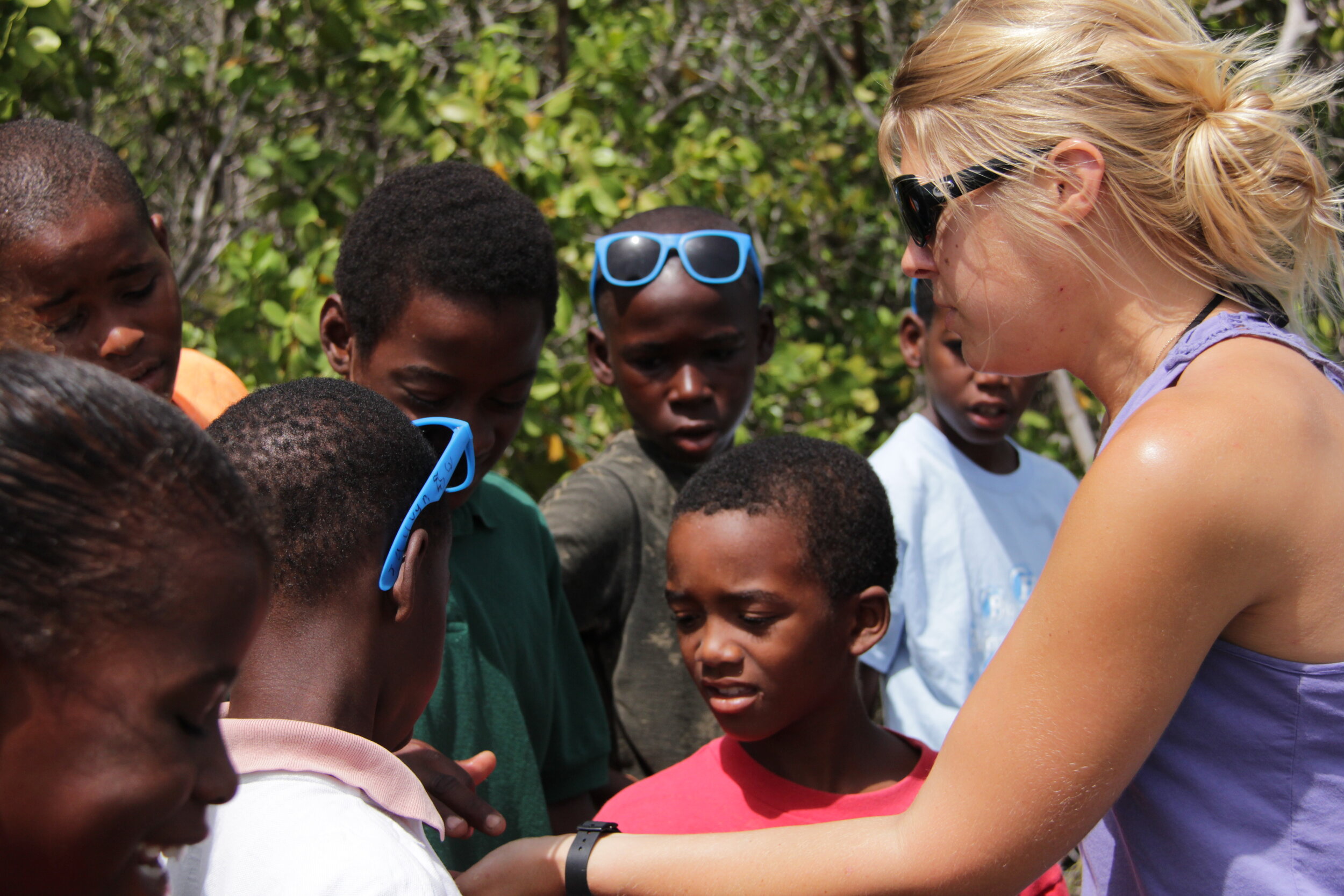Ocean Education – Let the Games Begin
Originally published on the (now archived) National Geographic blog.
Co-authored with Stephanie Roach, Waitt Institute Program Manager
July 14, 2015
Stephanie and students playing a twist on the game “Red Rover” to demonstrate the importance of mangroves during the 2014 summer ocean camp.
The Waitt Institute team is made up of people who spent their childhoods playing at the beach, swimming in the calm turquoise Caribbean Sea, and learning about the amazing, diverse creatures that live beneath the surface. Each of us fell in love with the ocean at a young age, and we’ve been thrilled to be able to share that love, excitement, and wonder with the children of Barbuda over the last two summers.
Two years ago, Ayana started a kids ocean summer camp on Barbuda, as part of the Blue Halo Initiative, with the support of local teachers. It was a week of art projects, games, singing, films, and interpretive dance. Last summer, Stephanie took the reins and added snorkeling, a field trip to the mangroves, a boat trip through the Codrington lagoon, a beach cleanup, and other activities explaining how our actions on land affect the sea.
Ayana playing an ocean food web game during the 2013 summer ocean camp.
For many of the kids, Blue Halo’s summer camp is their first time snorkeling along the coast and visiting the mangroves. This critical step in ocean conservation — building a deeper connection between young people and their waters, and building deeper knowledge of how it’s all connected — is key to ensuring a brighter ocean future. It’s a thrill to watch young eyes light up as kids connect the dots between parrotfish pooping sand and sandy beaches, and between the plastic bags strewn on the sand and the sea turtles they love eating mistaking them for jellyfish.
Our camps get these kids out of the classroom, but the learning certainly doesn’t stop. After we introduce new ocean science topics in the morning, the students go on an afternoon field trip full of ecology and conservation-themed fun and games — in the ocean.
This summer, the Waitt Institute is more than doubling the camp’s reach in Barbuda. We’re also starting to support kids ocean camps on Montserrat, one of our two new Blue Halo sites in the Caribbean. As part of Blue Halo Montserrat, we’re working with local groups to integrate ocean science and snorkeling into the Education, Sports, and Creative Arts Program (ESCAPE), an existing local summer camp.
Waitt Institute team visiting a school visit on Montserrat.
Also (because what’s cooler than a snorkel club?!) we’re teaming up with AQUA Montserrat to sponsor Fish N Fins, a year-round program to teach kids swim and snorkel skills, and provide hands-on education about local marine life. The Waitt Institute has donated 30 snorkel sets and wetsuits to the program to get the club started, and we’re excited to jump in the water with them soon to start pointing out all the cool fish and invertebrates they may have seen on the dinner table but not yet in their natural habitats.
We’re hoping these kids get to continue this essential ocean science throughout their education. We’ll be providing materials and training to teachers in schools throughout the islands we partner with to ensure students get a healthy dose of ocean learning all year round.
Field trip to Codrington Lagoon in Barbuda during the 2014 summer ocean camp.
Still, summertime is all about play. The camps are designed to get kids excited about the ocean and share that excitement with not only their peers, but also their parents. We teach the kids, and then they teach their parents the new fun ocean facts they’ve learned. And, of course, we’ll admit that splashing around in the Caribbean is a treat for us as Washington, DC-based marine biologists.
In the long term, we hope these camps and the school year activities will teach these delightful kids about the relationships between the food on their tables, the jobs in their communities, the cultural activities they treasure, the way the environment is cared for and managed — how it’s all connected. We hope to inspire a generation of kids who become scientists, fisheries managers, fishermen, park rangers, scuba instructors, tour guides, and good Samaritans who treasure the ocean and who use it, but know the importance of taking care not to use it up.
Students of St. Augustine Primary School on Montserrat learning about the Blue Halo Initiative.





